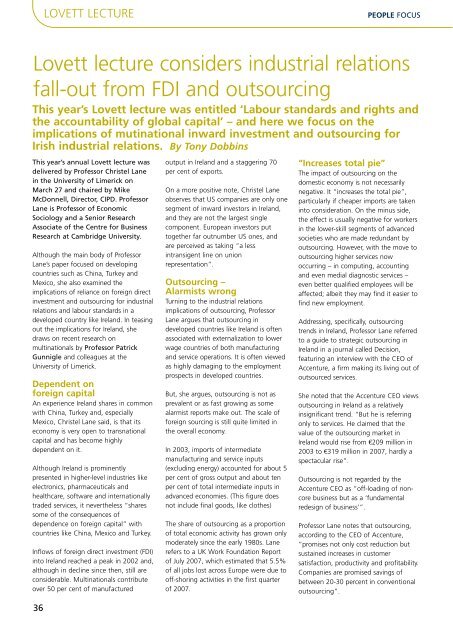PEOPLE FOCUS - CIPD
PEOPLE FOCUS - CIPD
PEOPLE FOCUS - CIPD
- TAGS
- people
- focus
- cipd
- www.cipd.co.uk
Create successful ePaper yourself
Turn your PDF publications into a flip-book with our unique Google optimized e-Paper software.
LOVETT LECTURE <strong>PEOPLE</strong> <strong>FOCUS</strong><br />
Lovett lecture considers industrial relations<br />
fall-out from FDI and outsourcing<br />
This year’s Lovett lecture was entitled ‘Labour standards and rights and<br />
the accountability of global capital’ – and here we focus on the<br />
implications of mutinational inward investment and outsourcing for<br />
Irish industrial relations. By Tony Dobbins<br />
This year’s annual Lovett lecture was<br />
delivered by Professor Christel Lane<br />
in the University of Limerick on<br />
March 27 and chaired by Mike<br />
McDonnell, Director, <strong>CIPD</strong>. Professor<br />
Lane is Professor of Economic<br />
Sociology and a Senior Research<br />
Associate of the Centre for Business<br />
Research at Cambridge University.<br />
Although the main body of Professor<br />
Lane’s paper focused on developing<br />
countries such as China, Turkey and<br />
Mexico, she also examined the<br />
implications of reliance on foreign direct<br />
investment and outsourcing for industrial<br />
relations and labour standards in a<br />
developed country like Ireland. In teasing<br />
out the implications for Ireland, she<br />
draws on recent research on<br />
multinationals by Professor Patrick<br />
Gunnigle and colleagues at the<br />
University of Limerick.<br />
Dependent on<br />
foreign capital<br />
An experience Ireland shares in common<br />
with China, Turkey and, especially<br />
Mexico, Christel Lane said, is that its<br />
economy is very open to transnational<br />
capital and has become highly<br />
dependent on it.<br />
Although Ireland is prominently<br />
presented in higher-level industries like<br />
electronics, pharmaceuticals and<br />
healthcare, software and internationally<br />
traded services, it nevertheless “shares<br />
some of the consequences of<br />
dependence on foreign capital” with<br />
countries like China, Mexico and Turkey.<br />
Inflows of foreign direct investment (FDI)<br />
into Ireland reached a peak in 2002 and,<br />
although in decline since then, still are<br />
considerable. Multinationals contribute<br />
over 50 per cent of manufactured<br />
36<br />
output in Ireland and a staggering 70<br />
per cent of exports.<br />
On a more positive note, Christel Lane<br />
observes that US companies are only one<br />
segment of inward investors in Ireland,<br />
and they are not the largest single<br />
component. European investors put<br />
together far outnumber US ones, and<br />
are perceived as taking “a less<br />
intransigent line on union<br />
representation”.<br />
Outsourcing –<br />
Alarmists wrong<br />
Turning to the industrial relations<br />
implications of outsourcing, Professor<br />
Lane argues that outsourcing in<br />
developed countries like Ireland is often<br />
associated with externalization to lower<br />
wage countries of both manufacturing<br />
and service operations. It is often viewed<br />
as highly damaging to the employment<br />
prospects in developed countries.<br />
But, she argues, outsourcing is not as<br />
prevalent or as fast growing as some<br />
alarmist reports make out. The scale of<br />
foreign sourcing is still quite limited in<br />
the overall economy.<br />
In 2003, imports of intermediate<br />
manufacturing and service inputs<br />
(excluding energy) accounted for about 5<br />
per cent of gross output and about ten<br />
per cent of total intermediate inputs in<br />
advanced economies. (This figure does<br />
not include final goods, like clothes)<br />
The share of outsourcing as a proportion<br />
of total economic activity has grown only<br />
moderately since the early 1980s. Lane<br />
refers to a UK Work Foundation Report<br />
of July 2007, which estimated that 5.5%<br />
of all jobs lost across Europe were due to<br />
off-shoring activities in the first quarter<br />
of 2007.<br />
“Increases total pie”<br />
The impact of outsourcing on the<br />
domestic economy is not necessarily<br />
negative. It “increases the total pie”,<br />
particularly if cheaper imports are taken<br />
into consideration. On the minus side,<br />
the effect is usually negative for workers<br />
in the lower-skill segments of advanced<br />
societies who are made redundant by<br />
outsourcing. However, with the move to<br />
outsourcing higher services now<br />
occurring – in computing, accounting<br />
and even medial diagnostic services –<br />
even better qualified employees will be<br />
affected; albeit they may find it easier to<br />
find new employment.<br />
Addressing, specifically, outsourcing<br />
trends in Ireland, Professor Lane referred<br />
to a guide to strategic outsourcing in<br />
Ireland in a journal called Decision,<br />
featuring an interview with the CEO of<br />
Accenture, a firm making its living out of<br />
outsourced services.<br />
She noted that the Accenture CEO views<br />
outsourcing in Ireland as a relatively<br />
insignificant trend. “But he is referring<br />
only to services. He claimed that the<br />
value of the outsourcing market in<br />
Ireland would rise from €209 million in<br />
2003 to €319 million in 2007, hardly a<br />
spectacular rise”.<br />
Outsourcing is not regarded by the<br />
Accenture CEO as “off-loading of noncore<br />
business but as a ‘fundamental<br />
redesign of business’”.<br />
Professor Lane notes that outsourcing,<br />
according to the CEO of Accenture,<br />
“promises not only cost reduction but<br />
sustained increases in customer<br />
satisfaction, productivity and profitability.<br />
Companies are promised savings of<br />
between 20-30 percent in conventional<br />
outsourcing”.

















